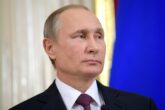October 19, 2021
The Myth of Russian Decline: Why Moscow Will Be a Persistent Power
The Biden administration came into office with a clear and unambiguous foreign policy priority: countering a rising China. The administration’s public statements, its early national security planning documents, and its initial diplomatic forays have all suggested that pushing back against Beijing’s growing global influence will be Washington’s national security focus, alongside transnational threats such as climate change and the COVID-19 pandemic. The question of how to deal with Russia, by contrast, has taken a back seat, returning to the fore only when Russian troops amassed on Ukraine’s border in April. That crisis served as a reminder of the danger of looking past Moscow—yet by July, President Joe Biden was back to declaring that Russia was “sitting on top of an economy that has nuclear weapons and oil wells and nothing else.”
Rather than viewing Russia as a declining power, U.S. leaders should see it as a persistent one—and have a frank conversation about the country’s true capabilities and vulnerabilities.
Biden is not the first American leader to think along these lines. Ever since the end of the Cold War, American politicians have periodically suggested that Russia’s days as a true global power are numbered. In 2014, John McCain, a Republican senator from Arizona, called Russia a “gas station masquerading as a country.” That same year, U.S. President Barack Obama dismissed Russia as a mere “regional power.” Not long thereafter, Russia successfully intervened in the Syrian war, interfered in the 2016 U.S. presidential election, and inserted itself into the political crisis in Venezuela and the civil war in Libya. And yet, the perception of Russia as a paper tiger persists.
The problem is that the case for Russian decline is overstated. Much of the evidence for it, such as Russia’s shrinking population and its resource-dependent economy, is not as consequential for the Kremlin as many in Washington assume. Nor should the United States expect that Russia will automatically abandon its course of confrontation once President Vladimir Putin leaves office. Putin’s foreign policy enjoys widespread support among the country’s ruling elite, and his legacy will include a thicket of unresolved disputes, chief among them that over the annexation of Crimea. Any disagreements with the United States are here to stay.
Read the full article from Foreign Affairs.
More from CNAS
-
Trump ‘Humiliated’ as Putin Sends Clear Message That He Doesn’t Care About US
"Putin is not playing ball." Putin's Palm Sunday attack on Sumy is "embarrassing for the White House" as it comes just days after Steve Witkoff met with the Kremlin, says adju...
By Jim Townsend
-
The Hidden Past and Uncertain Future of the U.S. and Ukraine with Celeste Wallander
Under the Trump administration, U.S. support for Ukraine is no longer guaranteed. President Trump's pause on aid and intelligence to Ukraine in March may have been brief, but ...
By Andrea Kendall-Taylor, Jim Townsend & Celeste Wallander
-
Is Russia Under Pressure?
Since 2014, the United States and its allies have provided increasing military support to Ukraine while imposing more and tougher economic sanctions on Russia, especially sinc...
By Jeffrey Edmonds
-
Europe's Trade War Woes
On April 2nd, President Trump imposed sweeping tariffs across the globe – with only a handful of countries left untouched. The EU was hit with tariffs of 20% and the European ...
By Andrea Kendall-Taylor & Jim Townsend



